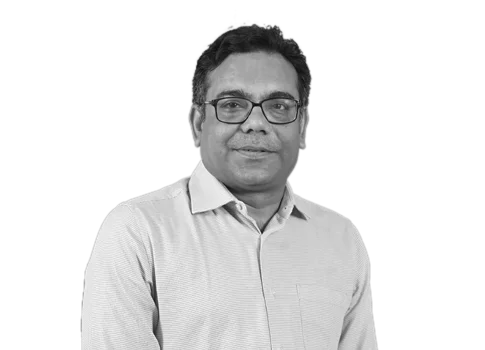- Home
- Faculty
- School of Health Sciences and Technology
- Dr. Subhajit Basu

Dr. Subhajit Basu
Associate Professor
Profile Summary
Work Experience
Research Interests
Teaching Philosophy
Courses Taught
Awards and Grants
- PBC-Israel Fellowship for Outstanding Postdoctoral Researchers from India (2014-2017)
- Post-doctoral Fellowship, Hebrew University of Jerusalem, Israel (2017 – 2019)
- EMBO (European Molecular Biology Organization) Fellowship (2016)
- ASSEMBLE+ fellowship for research at Hebrew University of Jerusalem, Israel (2022)
- SAC ISRO fellowship for project assistants at NIO, Goa (2007 – 2010)
- Early career Researcher award to present at Xiamen Symposium on Marine Environmental Sciences (XMAS-IV 2019), Xiamen, China
Scholarly Activities
Subhajit has presented his research work in numerous conferences in India and abroad. He is a review editor of Frontiers in Microbiology, Scientific Reports, Process Biochemistry, and Current Microbiology. He is a professional member of the American Society of Limnology and Oceanography (ASLO) and the Geological Society of India (GSI). During his stay at Max Planck, Subhajit was engaged in teaching Fe biogeochemistry for the M.Sc. / Ph.D. graduate program of International Max Planck Research School of Marine Microbiology (MarMic). Subhajit has so far actively mentored ~10 undergraduate students, and 2 master's students. Presently, he is guiding 4 PhD students.
His selected publications are as below:
- Van Erk M, Bourceau, Moncada C, Basu S, Hansel CM, Beer DD (2023) Reactive oxygen species affect the potential for mineralization processes in permeable intertidal flats. Nature Communications 14:938, doi: 10.1038/s41467-023-35818-4
- Shaked Y, Beer DD, Wang S, Zhang F, Visser AN, Eichner M, Basu S (2023) Co-acquisition of mineral-bound iron and phosphorus by natural Trichodesmium colonies. Limnology and Oceanography 9999:1-14
- Koedooder C, Zhang F, Wang S, Basu S, Berman-Frank I, Shaked Y (2022). Metagenomes of Red Sea subpopulations challenge the use of morphology and marker genes to assess Trichodesmium diversity. Frontiers in Microbiology 13:879970
- Kessler N, Armoza-Zvuloni E, Wang S, Basu S, Weber PK, Stuart RK, Shaked Y (2020) Selective Collection of Iron-Rich Dust Particles by Natural Trichodesmium colonies. The ISME Journal 14(1): 91-103
- Gledhill M, Basu S, Shaked Y (2020) Metallophones associated with Trichodesmium erythraeum colonies from the Gulf of Aqaba. Metallomics 11: 1547-1557.
- Eichner M, Basu S, Wang S, Beer D, Shaked Y (2020) Mineral iron dissolution in Trichodesmium colonies: The role of O2 and pH microenvironments. Limnology and Oceanography 65(6): 1149-1160
- Basu S, Gledhill M, Beer D, Matondkar SGP, Shaked Y (2019) Colonies of marine cyanobacteria Trichodesmium interact with associated bacteria to acquire iron from dust. Communications Biology 2:284 4; https://doi.org/10.1038/s42003-019-0534-z
- Eichner M, Basu S, Gledhill M, Beer D, Shaked Y (2019) Hydrogen Dynamics in Trichodesmium Colonies and Their Potential Role in Mineral Iron Acquisition. Frontiers in Microbiology 10:1565
- Basu S, Shaked Y (2018) Mineral iron utilization by natural and cultured Trichodesmium and associated bacteria. Limnology and Oceanography 63(6): 2307-2320
- Gomes HdoR, Goes JI, Matondkar SGP, Buskey EJ, Basu S, Parab S, Thoppil P (2014) Massive outbreaks of Noctiluca scintillans bloom in the Arabian Sea due to spread of hypoxia. Nature Communications 5:4862
- Basu S, Deobagkar DD, Matondkar SGP, Furtado I (2013) Culturable bacterial associated with the dinoflagellate green Noctiluca miliaris during active and declining bloom phases in the Northern Arabian Sea. Microbial Ecology 65(4): 934-954
- Basu S, Matondkar SGP, Furtado I. Retrieved bacteria from Noctiluca miliaris (green) bloom of the Northeastern Arabian Sea (2013) Chinese Journal of Oceanology and Limnology 31(1):10-20
- Basu S, Matondkar SGP, Furtado I (2011) Enumeration of bacteria from a Trichodesmium spp. bloom of the eastern Arabian Sea: elucidation of their possible role in biogeochemistry. Journal of Applied Phycology 23(2): 309-319
Contact